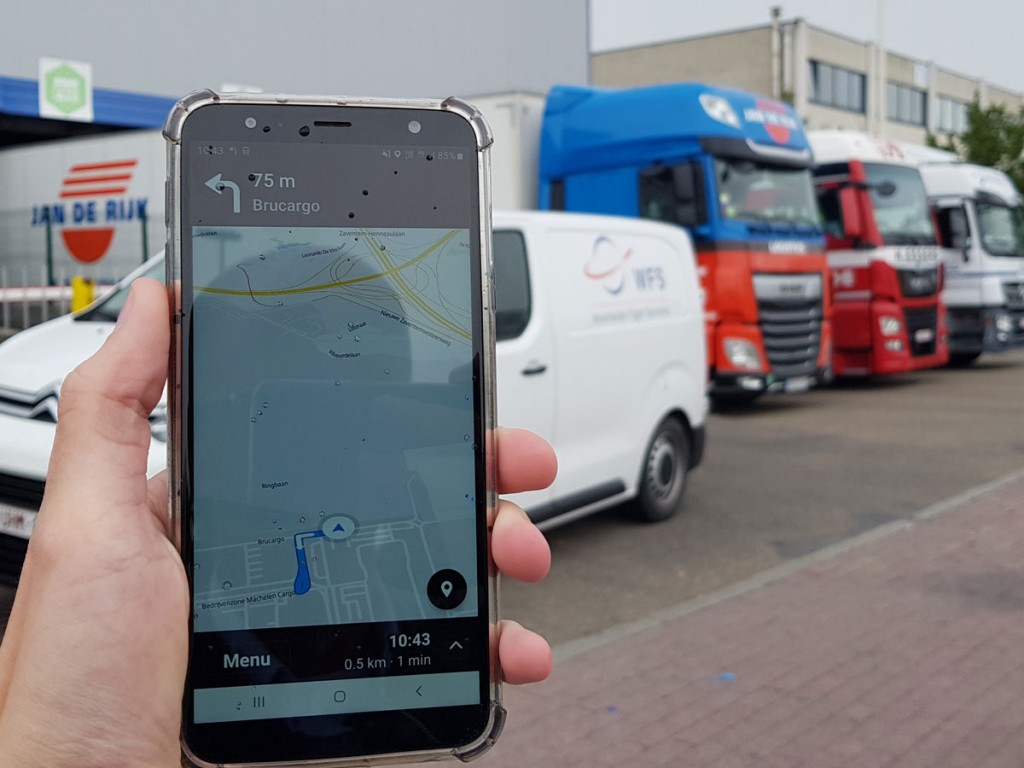WFS joins latest Brucargo ‘Digital Green Lane’ initiative
Mar 15, 2021Worldwide Flight Services (WFS) is working with Brussels Airport and the Air Cargo Belgium community to help eliminate waiting times for international road feeder services in the latest initiative to support Brucargo’s ‘Digital Green Lane’.
Two years ago, WFS was one of the first cargo handlers to sign up for Brucargo’s slot booking app, which allows local freight forwarding and transport providers to request a single or recurrent time slot to deliver or collect export and import air cargo shipments. WFS now receives some 2,000 slot requests a month from companies using the centralised web application.

The latest phase of the Brucloud project – developed by Air Cargo Belgium, technology provider Nallian, Brussels Airport and the air cargo community stakeholders – is to pilot a new Road Feeder Management App to digitally improve the efficiency of the interface between trucking operators and handling providers. Four trucking providers are participating in the pilot; H.Essers, Jan de Rijk, Ninatrans and Wallenborn.
The app allows for automatic booking of flexible slots for cargo drop-offs and collections by Road Feeder Services operators which can shift in time according to the estimated time of arrival (ETA) sent by the truck driver. Once registered, the app tracks the progress of the vehicle and gives the driver an updated time slot prior to arriving at the cargo terminal. As well as simplifying the communications process, the app aims to ensure drivers and trucks benefit from a better and priority service by eliminating waiting times which can occur when vehicles arrive at a cargo terminal and are processed in order with other trucks.
For WFS, the pilot offers the opportunity to gain real-time insight of predicted workflows, which allows it to optimise personnel planning to ensure fast, timely, safe and secure handling of cargo shipments carried onboard its airline customers’ flights to and from Brussels.
“WFS is keen to participate in and support digital solutions which improve customer experience and the overall efficiency of our operations. Brucloud is already making a significant difference to the way the air cargo community in Brussels works together and provides a win-win scenario for all stakeholders. I am confident we will see very encouraging results from the pilot of the Road Feeder Management application because it addresses some of the key challenges trucking and handling companies face; timeslots and planning are not always predictable due to changing traffic conditions, we rely heavily on manual exchange of information, and language barriers can mean a lack of clear communication with truck drivers. This new app addresses another key milestone in the ‘Digital Green Lane’ process and has the potential to benefit the entire Brussels Airport community once we complete this trial stage,” said Koen Gouweloose, Managing Director, Belgium, at WFS.
The app is the latest digital solution developed by the Brussel Airport cargo community to address challenges linked to industry fragmentation for the transportation of goods from manufacturer to consumer, and inefficiencies resulting from a lack of visibility of the end-to-end process. Supported by airlines, GSSAs, handlers, forwarders, truckers and others, BRUcloud is an open data sharing platform with multiple collaborative apps which enable the Brussels Airport cargo community to act as an integrated network. It provides an agile and flexible digital roadmap using dashboards and analytics to achieve smart logistics solutions.
David Bellon, Chairman of Air Cargo Belgium Chairman, commented: “A new step taken in the digitization of our air cargo community at Brussels Airport. With this announcement, WFS confirms its strong engagement in the roll-out of the digital landscape at Brucargo. Air Cargo Belgium looks forward to collaborating with WFS and its customers to implement the green lane processes and improve efficiency and quality for all stakeholders in the community. We thank WFS for all its efforts and support.”
WFS opened a new 250,000 tonnes capacity cargo terminal at Brussels Airport in January which already uses new technologies and digital processes to improve the efficiency of truck handling. Truck drivers arriving at the building are welcomed at kiosk-based, self-service reception points, enabling them to stay in their vehicles, before being immediately assigned to one of the terminal’s 40 cargo gates.
Similar Stories

ECS Group partners with CargoAi to digitalize manual email quotation processes with their CargoCoPilot API
View Article
Chapman Freeborn restructure to expand European cargo operations
View Article
United Airlines fourth quarter profit ahead of expectations
View Article
WorldACD Weekly Air Cargo Trends (week 2) - 2025
View Article
Cathay Pacific releases traffic figures for December 2024
View ArticleXeneta announces Board of Director changes, supporting the transformation of ocean and air freight markets
Xeneta, the global reference for ocean and air freight rate data and intelligence, has announced changes to its Board of Directors. Marie-Pierre Rogers has been appointed as the new Chair,…
View ArticleGet the most up-to-date trending news!
SubscribeIndustry updates and weekly newsletter direct to your inbox!





